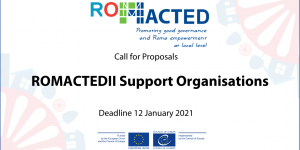Today, the Commission adopted its annual report on Roma integration.
This year’s assessment provides, for the first time, an overview of the measures put in place by Member States following the 2013 Council Recommendation on effective Roma integration measures, which required them to develop National Roma Integration strategies to promote access of Roma to education, employment, healthcare and housing.
Frans Timmermans, First Vice-President of the European Commission, said: “Roma are part of our societies, and they are part of Europe. This report comes as a timely reminder for Member States to show more political determination and implement their commitments to integrate Europe’s Roma communities. Member States should use to the full the relevant policy, legal and financial tools to ensure equal opportunities and Roma inclusion.”
Věra Jourová, Commissioner for Justice, Consumers and Gender Equality said: “There is still more to be done for Roma inclusion in all areas, from education to housing or employment. In the past year, there have been some positive developments, especially in the area of education. At the same time, educational segregation of Roma children persists in some Member States and the Commission had to take action to make sure anti-discrimination legislation is enforced.
The Commission has stepped up its efforts to ensure correct implementation of anti-discrimination legislation towards Roma, including at local level, by launching infringement procedures when legislation, such as the Racial Equality Directive is not properly enforced, notably in education. The Commission is supporting the implementation of the Member States’ National Roma integration strategies by providing funding under the European Structural and Investment Fund(ESIF) for 2014-2020.
The report shows that Member States have achieved progress in a number of areas, but more efforts are still needed:
- Member States invested in education as a means of integration: the majority of Member States reported measures relevant to early childhood education and care, early school leaving, inclusive education and individualised support. But not enough measures were taken against the exclusion from the workplace and forced evictions of Roma have continued in 2015 without any offer of alternative housing.
- Better use of EU funds for the integration of marginalised communities:The European Structural and Investment (ESI) Funds support social inclusion measures for marginalised communities, the regeneration of deprived urban areas and investments in human capital.Several Member States introduced a specific investment priority for the integration of marginalised communities, such as Roma, under the European Structural and Investment Fund(ESIF) It allows for explicit targeting and better monitoring of results. National contact points have also facilitated the distribution of the funding.
- Closer cooperation with civil society and local authorities:Several Member States have established coordination structures for Roma integration, involving diverse stakeholders. National strategies are increasingly translated into local action plans, and the National Roma Contact Points are more closely involved in making the best use of EU funds. The Commission will support Member States in developing national platforms for Roma inclusion to ensure a more effective cooperation on the ground.
The Commission calls on Member States to step up efforts to enforce anti-discrimination legislation and eliminate segregation in education and housing to prevent forced evictions. The Commission urges Member States to demonstrate greater political will and a long-term vision to combat discrimination of Roma people.
Annex
Horizontal measures to fight discrimination
| Measures recommended by the Council | Member States that have reported a measure |
| Ensure effective practical enforcement of the Racial Equality Directive | BE, BG, CZ, DE, FI, HR, IT, LT, SI, SK, UK |
| Implement desegregation measures regionally and locally | ES, HR, SK |
| Ensure that forced evictions are in full compliance with EU law and international human rights obligations | – |
| Raise awareness about the benefits of Roma integration | AT, ES, LV |
| Raise public awareness of the diverse nature of societies, sensitise public opinion to Roma inclusion | AT, DE, ES, LV, PT, SI, SK, |
| Combat anti-Roma rhetoric and hate speech | AT, DE, ES, HR, SE, SK |
| Combat multiple discrimination of Roma children and women | AT, CZ, DE, ES, HR, HU, PT, SE, SI, SK |
| Fight (domestic) violence against women and girls | AT, DE, EL, ES, FI, HR, HU, UK |
| Fight trafficking in human beings | AT, BG, HR, HU, IT |
| Fight underage and forced marriages, and begging involving children | SI |
| Support the active citizenship of Roma by promoting their social, economic, political and cultural participation | AT, BE, BG, CZ, DE, ES, FI, HR, HU, LT, LV, PT, SE, SI SK, UK |
| Promote the training and employment of qualified mediators | BE, BG, CZ, ES, HR, PT, SI |
| Raise rights awareness among Roma | AT, DE, ES, HR |
| Other | BE, BG, FR, HU, HR, IT, LV PT, UK |
Education access
| Measures recommended by the Council | Member States that have reported a measure |
| Eliminate segregation | BE, BG, ES, IE, IT, RO, SI, SK |
| End misplacement in special needs schools | BG, CZ, SK |
| Fight early school leaving | AT, BE, BG, CY, DE, ES, FI, FR, HR, HU, IT, RO, SE, SK, UK |
| Promote access to and quality of early childhood education and care | AT, BG, CZ, ES, FI, HR, HU, IT, PL, RO, SK |
| Provide individualised support | AT, CZ, DE, ES, HR, IT, LT, LV, PL, RO, SK, UK |
| Promote inclusive teaching and learning methods | AT, BG, CY, CZ, DE, ES, HR, HU, LV, PT, RO, SI,SK, UK |
| Encourage parental involvement and teacher training | AT, BE, BG, CY, DE, ES, FI, IT, LV, SI, SK |
| Promote participation and completion of secondary and higher education | AT, BG, CZ, DE, ES, FI, HR, HU, PL, UK |
| Widen access to second-chance education and adult learning | UK, BG, CY, DE, ES, SI |
| Other | BE, CZ, ES, FI, DE, HR, HU, IT, LT, LV, RO, SI, SK, UK |
Employment access
| Measures recommended by the Council | Member States that have reported a measure |
| Support first work experience, vocational training, on-the-job training and lifelong learning | AT, BE, BG, DE, EL, ES, FI, HR, HU, IT, LT, LV, PL, PT,SI, SK, UK |
| Support self-employment and entrepreneurship | AT, BE, BG, ES, HR, HU, LT, SI, SK |
| Provide equal access to mainstream public employment services with individualised support | AT, BE, BG, DE, ES, FR, HR, HU, IT, LV, PT, SE, SI, SK |
| Eliminate barriers, including discrimination, to (re)entering the labour market | AT, FI, DE, ES, HR, HU, LT, SK, UK |
| Other | BE, CZ, EL, HU, LT, PT, RO, SK |
Healthcare access
| Measures recommended by the Council | Member States that have reported a measure |
| Remove barriers to access the healthcare system | AT, BE, BG, CZ, DE, ES, FI, FR, HU, LT, PL,RO, SE, SI, SK, UK |
| Improve access to medical check-ups, pre- and postnatal care, family planning, etc. | AT, BG, DE, ES, IT, PL, SI, SK
|
| Promote access to free vaccination programmes targeting children, and the most disadvantaged groups and areas | AT, BE, BG, DE, ES, HU, PL, RO, SI, SK |
| Promote health awareness | AT, BG, CZ, DE, ES, FI, HR, HU, IT, PL, SI, SK |
| Other | BE, BG, EL, ES, FI, HR, IT, LT, PL, SK |
Housing access
| Measures recommended by the Council | Member States that have reported a measure |
| Eliminate any spatial segregation and promote desegregation | CZ, HU, ES, IT, RO |
| Promote non-discriminatory access to social housing | AT, BE, BG, CZ, DE, ES, FI, FR, IT, SK, UK |
| Provide halting sites for non-sedentary Roma | AT, BE, FR, UK |
| Ensure access to public utilities | ES, HR, RO, SI |
| Other | AT, BE, BG, CZ, ES, HR, HU, IT, LT, PL, PT, RO, SK |
For more information
Communication assessing the implementation of the EU Framework for National Roma Integration Strategies and the Council Recommendation on effective Roma integration measures in the Member States
Factsheet on the 2016 report
Other information on Roma in the EU
Funding by the European Social Fund (ESF) to fight marginalisation of Roma



